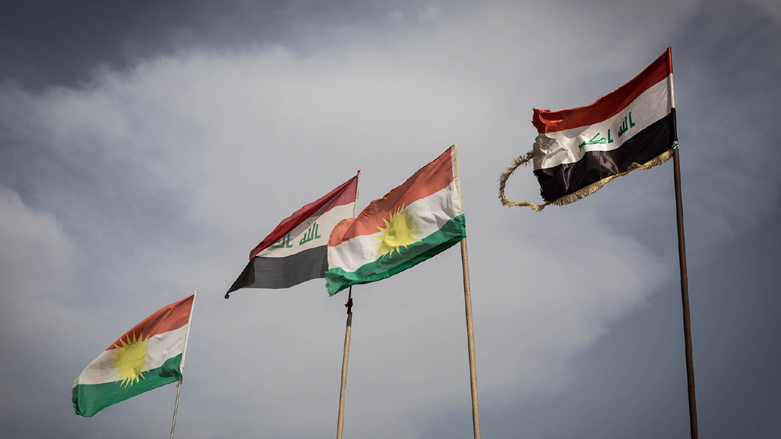KRG delegation in Baghdad seeks ‘definitive solution’ to budget disputes

ERBIL (Kurdistan 24) – A Kurdistan Regional Government (KRG) delegation on Thursday continued meetings in Baghdad with top officials and leaders in the federal government, offering Erbil's suggestions to settle and find a "definitive solution" to lingering disputes, namely the oil-for-budget arrangement between the two.
The KRG team, headed by Deputy Prime Minister Qubad Talabani, arrived in Baghdad on Tuesday and began a series of intensive meetings with Iraqi officials on the following day. This came after the General Secretariat of the Iraqi Council of Ministers ordered the federal Finance Ministry to suspend monthly payments of the region's share of the national budget.
Related Article: Kurdistan challenges Iraq's budget payment freeze as KRG delegation meets with Baghdad officials
The delegation met with Iraqi Oil Minister Thamir Ghadhban on Thursday for a second time since arriving in the national capital. The two sides discussed "the importance of resolving the outstanding problems, especially concerning oil and the federal budget," read a KRG statement summarizing the first gathering.
Also on Wednesday, Parliament Speaker Mohammed Halbousi agreed with the KRG delegation that the renewed frictions "need a definitive solution."
In that regard, the KRG delegation had presented a new proposal, according to a statement outlining one of the Thursday discussions. The Talabani-led team also decided that "in the near future, a meeting would be held to arrive at a mutual and comprehensive agreement" but gave no details.
Talabani and his accompanying delegation also sat down with Iraqi Finance Minister Fuad Hussein, a Kurd, who described the Erbil-Baghdad discussions held so far as "positive," according to another statement.
The team also met with US Ambassador to Iraq Matthew Tueller, discussing the latest Erbil-Baghdad developments as well as "the formation of Iraq's new cabinet." Talabani reaffirmed Erbil's support for the newest prime minister-designate, Mustafa al-Kadhimi, and the KRG's commitment to solving the disputes.
Former PMs
Finishing off Wednesday's gatherings, the KRG delegation separately visited former Iraqi prime ministers Nouri al-Maliki and Haider al-Abadi. The administrations of both had relationships with the Kurdistan Region that were often contentious, turning violent in late 2017 when Abadi-led forces attacked Kurdish-held areas in disputed territories such as Kirkuk in response to the Kurdistan Region's independence referendum.
Both former leaders now lead separate coalitions in the Iraqi parliament.
KRG statements again gave few specifics, announcing that Talabani and the Iraqi politicians "exchanged views on the root causes of the problems between Erbil and Baghdad, and agreed these issues need a firm solution," and that he shared "proposed solutions to the disputes," culminating in an agreement "to maintain this exchange of views in a bid to reach a deal on these issues."

Erbil-Baghdad relations have always been fraught with disputes, nearing a total breakdown during the Abadi era. Since then, however, the two governments eventually converged to some extent on a range of issues, especially after Prime Minister Adil Abdul Mahdi came into office in late 2018.
Still, oil and budget have remained a significant source of dispute between the central government and KRG, first starting when the autonomous region began to export its oil independently. A 2019 deal with the Abdul Mahdi administration stipulated that the KRG must deliver Baghdad 250,000 barrels per day (bpd) in return for, among other things, securing the region's allocation in the Iraqi federal budget.
The Kurdistan Region did not implement the oil handover, but then in late 2019, Erbil again renewed the agreement amid new negotiations. But, Abdul Mahdi explained during a press conference in mid-2019, the federal government has deducted the KRG's share of the national budget by the amount equivalent to the oil barrels owed.
In late 2019, Abdul Mahdi resigned as members of the Iraqi security forces and Iranian-backed militias brutally cracked down on anti-government protesters demanding the expulsion of the ruling elite whom they see as unabashedly corrupt and criminally negligent in dealing with the woes of the public.
Following nearly five months of protracted talks between top Iraqi leaders from the ruling Shia camp on a successor, they appear to have finally agreed on Mustafa al-Kadhimi, the country's intelligence chief until his nomination for prime minister.
Related Article: Iraqi PM-designate sends gov't program to parliament, proposed cabinet 'in the days to come'
Top Kurdish leaders have welcomed Kadhimi's candidacy. Despite his chances looking better than two others who came before him—Adnan al-Zurfi and Mohammed Allawi—, Kadhimi's bid at forming a new cabinet has been plagued by long-running intra Shia political wrangling.
Kadhimi said in a tweet on Monday, "I will only accept what is in the true interest of Iraq, and reject any pressure aimed at undermining it. We should all prioritize what is best for our country." He then said on Wednesday that he had sent the national legislature his government program and that his proposed cabinet would follow soon.
The two key security ministries of defense and interior, however, reportedly remain vacant.
Editing by John J. Catherine
